Poltava’s churches behind bars
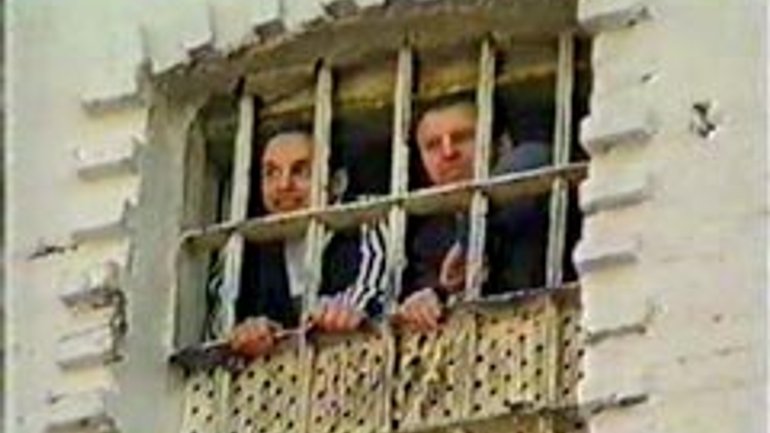
RISU’s Ukrainian-language site posted the text on 22 November 2007.
According to psychologists, mental suffering inflicts 10 times more pain than torture. But can criminals who have committed dozens of “grave” sins feel their consciences? What is their way to Golgotha and what power makes a minister of a murderer? RISU correspondent Olha TARANENKO studied the subject.
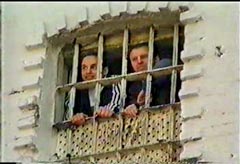 A popular Ukrainian saying says: “Do not rule out [the possibility of] jail and poverty.” As a confirmation of that truth, they “publicly” put behind bars in our country even representatives of the political and cultural elite. Not to mention common mortals, for uncompromising Justice does not forgive sins. Sometimes she even adds other people’s sins to one’s own sins.
A popular Ukrainian saying says: “Do not rule out [the possibility of] jail and poverty.” As a confirmation of that truth, they “publicly” put behind bars in our country even representatives of the political and cultural elite. Not to mention common mortals, for uncompromising Justice does not forgive sins. Sometimes she even adds other people’s sins to one’s own sins.
Even the ordinary peasant Petro, who was drunk after a party and killed someone on the road as he was driving in such a condition, can find himself in jail next to professional thieves, serial killers or dishonest bankers.
A young student who began to steal from her rich fellow students out of envy and was caught with the smoking gun can also end up in prison.
Each convict has his own life story, but life prospects are, unfortunately, the same for everyone. According to statistics, 85% of people who were imprisoned once return to prison after some time. Penitentiary institutions, which are intended to re-educate violators, are, in reality, “retraining courses” for criminals.
Since Ukraine gained its independence, the workers of the State Department on Penal Sentences have realized that criminals should not only do their time but purify their souls (that is, change their system of values). Therefore, in recent years, prison churches have begun to appear on a mass scale in prisons. For instance, in central Ukraine’s Poltava Region alone in the seven prisons there are 11 prayer rooms and two large churches of various denominations. Another 11 groups of believers have no rooms of their own and gather in the premises of clubs or in the barracks. 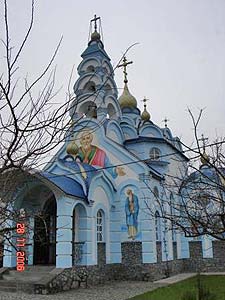 The ministers who provide pastoral care to convicts are Christians. According to information received from the Department on Penal Sentences in the Poltava Region, they have not been approached by representatives of other religious associations with requests to organize places of worship in prisons.
The ministers who provide pastoral care to convicts are Christians. According to information received from the Department on Penal Sentences in the Poltava Region, they have not been approached by representatives of other religious associations with requests to organize places of worship in prisons.
The biggest (in terms of size and number of convict-parishioners) religious building belongs to the Ukrainian Orthodox Church-Moscow Patriarchate. The Church of St. Nicholas was dedicated last year in Prison 64 in the Poltava Region. Everything, starting from the foundation to the icon screen, was done by the convicts themselves. 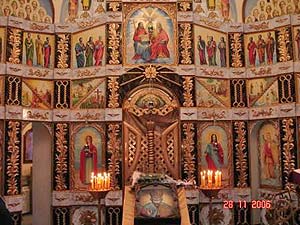 According to prison workers, there are very gifted people among the convicts, and, however surprising it may seem, the stricter the regime is, the more talents one can find. Convicts atoning for their sins in Prison 64 are mostly people who committed severe crimes, therefore they built the church excellently. The construction was financed, so to say, by all together: part of the money was received from “lay people” at liberty, another part was earned by the convicts themselves and another part of expenses was borne by the Board of the Department on Penal Sentences in the Poltava Region. By the way, it was its head, Mykola Isaiev (former head of Prison # 64), who initiated the construction of the prison church. Now, 120 people on average attend services every Sunday there.
According to prison workers, there are very gifted people among the convicts, and, however surprising it may seem, the stricter the regime is, the more talents one can find. Convicts atoning for their sins in Prison 64 are mostly people who committed severe crimes, therefore they built the church excellently. The construction was financed, so to say, by all together: part of the money was received from “lay people” at liberty, another part was earned by the convicts themselves and another part of expenses was borne by the Board of the Department on Penal Sentences in the Poltava Region. By the way, it was its head, Mykola Isaiev (former head of Prison # 64), who initiated the construction of the prison church. Now, 120 people on average attend services every Sunday there.
The pastor of the Roman Catholic Church of the Exaltation of the Holy Cross, Fr. Pavlo Kubiak, OMI, has been visiting Prison 16 (where mostly young boys do their sentences) for half a year. The priest and his “wards” gather in a special prayer room. He has strayed from the usual forms of service in his work with the convicts.
”My work in prison is like work in the Middle Ages,” said Fr. Kubiak. “People could not write and read then, and priests taught people through icons. That is, they decorated churches with pictures about the life of Jesus. Everything was on the walls, and people who came to the church could learn a lot. It was evangelization of the poor. When I came to prison and saw the guys, I realized at once that they could not hear what I told them at all. They were bored and not interested. It was very difficult to make them concentrate on anything. They did not study in universities, some did not even complete their school studies or cannot read. I thought a lot as to how to reach their hearts for them to be able to understand the word of God and desire to change their lives. I found sponsors, bought a computer and a projector, and began to show them movies, on the basis of which I built the study. We viewed ‘The Passion of the Christ,’ ‘Chronicles of Narnia,’ ‘The Devil’s Advocate,’ and even ‘Shrek.’ After the viewing, I tell them about one’s life choice, the work of the Holy Spirit inside a man, pride, etc. And they listen. Perhaps some come to watch movies, but many stay to listen to the sermons. In the end, we pray with them together.”
According to Fr. Kubiak, such “sowing” is beginning to yield good fruit. 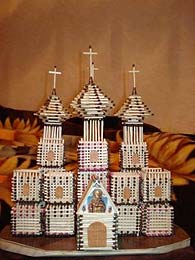 "I teach them to live in order to give and not to get. To live like Jesus. And they began to understand this. They even bring me tea, which is a kind of a currency in prison. I was very moved when a gypsy thief presented to me a cigarette lighter with a flashlight. Another youngster made a figure of liberty out of plaster and a church of matches on New Year’s for me. I see they are opening up, they want to have a cross to wear on their neck. They regret about what they did and realize their crimes. For they usually say in prison: ‘I am not guilty. I did not kill my mother-in-law. She fell on me herself seven times in a row. I just held a knife at the moment.’ Whereas in the church, they re-think their deeds and many get pangs of conscience. People say it is right to put people behind bars, as they are re-educated there. In reality, they become worse there, for there are very few professional psychologists who can help them understand their crime, repent and make a decision not to do it again. And it is easier even for the prison administration to work with people who attend church,” said Fr. Kubiak.
"I teach them to live in order to give and not to get. To live like Jesus. And they began to understand this. They even bring me tea, which is a kind of a currency in prison. I was very moved when a gypsy thief presented to me a cigarette lighter with a flashlight. Another youngster made a figure of liberty out of plaster and a church of matches on New Year’s for me. I see they are opening up, they want to have a cross to wear on their neck. They regret about what they did and realize their crimes. For they usually say in prison: ‘I am not guilty. I did not kill my mother-in-law. She fell on me herself seven times in a row. I just held a knife at the moment.’ Whereas in the church, they re-think their deeds and many get pangs of conscience. People say it is right to put people behind bars, as they are re-educated there. In reality, they become worse there, for there are very few professional psychologists who can help them understand their crime, repent and make a decision not to do it again. And it is easier even for the prison administration to work with people who attend church,” said Fr. Kubiak.
Persons who minister in Orthodox and Catholic prison churches are mostly priests, whereas in the Protestant churches these are mostly former convicts whose life path was turned by God 180 degrees. Such vivid testimony of the reality of the “reincarnation” of former thieves, drug-addicts, pimps and murderers into believing, law-abiding citizens “shut the mouths” of the most incorrigible atheists. To enhance the effect, sometimes even the wives of such missionaries are allowed to present their evangelization programs in prisons. Then, according to eye-witnesses, tears appear in the eyes of many criminals. The real tears of the happy wives, their stories about happy family life and photos of pink-cheeked babies move even the residents of the strict security prisons. And no wonder, because only one in tens of thousands of convicts will have such a future. After prison, few of them will be able to return to normal life. 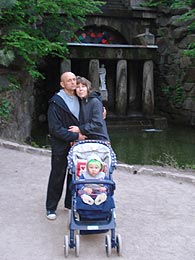 Vasyl Vedmid is just such a case, which, according to him, was possible only thanks to the mercy and power of God. At the age of 42, he got married and became a father. In the past, he was in military service in Afghanistan, committed dozens of crimes and served two prison sentences. And now he is the head of a happy family.
Vasyl Vedmid is just such a case, which, according to him, was possible only thanks to the mercy and power of God. At the age of 42, he got married and became a father. In the past, he was in military service in Afghanistan, committed dozens of crimes and served two prison sentences. And now he is the head of a happy family.
Vasyl and his brothers in the faith Serhii Perepelytsia and Oleksandr Taranenko from the evangelical Salvation Church in Poltava visit Reformatory 16. Their preaching is primarily the story of their life itself, the dark pages of the past and “rosy” pages of today.
”The word of God has real power. One just needs to believe it and repent. God will change your life as he changed ours. With these words we come to the guys,” said the preachers.
“No man, no psychology, can change the stone heart of a thief, but this is possible for God: ‘If you repent of your sins, I will clothe you with white clothes…’ We were able to start our lives from a blank sheet only with God. We wanted to take everything from life ourselves and sought pleasures. We had much money, any girls we wished, we enjoyed drugs… But we had no joy in our heart, for someone’s tears were behind our pleasure. Praise God that one day we were told about the true way. Only in God did we understand what real human happiness is. Now we share that news with other convicts,” said the preachers. 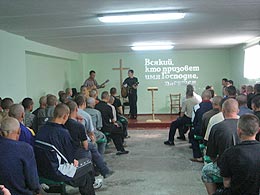 The preachers together with young men who responded to the preaching of the former convicts, who now call themselves “new creation in Christ,” renovated 150 square meters of the basement area. The prison church Freedom in Christ was established precisely there.
The preachers together with young men who responded to the preaching of the former convicts, who now call themselves “new creation in Christ,” renovated 150 square meters of the basement area. The prison church Freedom in Christ was established precisely there.
Sashko became a member of that “congregation.” He was doing his 10-year sentence for two murders. As a boy, he met a thief who began to teach him his “art.” Sashko took the criminal path. At first, small thefts, then robberies, and it all ended in a mass clash. After eight years in prison, the 23-year old fellow saw no prospects for his future. Until he met his future “brothers in the faith.”
“Something was happening to me. I heard their sermons and understood that I lived a wrong life. I began to read the Bible and realized that I was a sinner. When I repented, my heart was filled with great joy, as if a heavy burden was lifted from my shoulders. I even began to sing. The guys from my barrack said that even my eyes began to shine,” said Sashko.
The leadership of the prison also noticed changes in the behavior and worldview of Sashko. In half a year, his case was submitted for revision and he was released two years ahead of time for his excellent behavior. He lived in Poltava for a few weeks (he was adapting to life at liberty) and then he returned home to the town of Dniprorudne, Zaporizhzhia Region. There he became an active member of the Christian church and works as a carpenter.
For ordinary people, a murderer is a bad person whom society has “crossed out.” For our mentality, to imagine a murderer become a saint and even a spiritual father is really difficult. Whereas the Bible contains three examples of murderers who became a blessing for entire nations after encounters with the Lord. This is the liberator of the Jews from the Egyptian slavery, Moses; the “man after God’s heart,” King David; and the apostle Paul, who brought the good news to the Gentiles. Their stories show that God can forgive even severe sins and give new life to people. The police also recognize what God does in the hearts of convicts. Such guys very rarely commit repeat crimes. If the church admits such people into its circle in freedom, the former convicts mostly return to normal life: they find jobs, get married and have children.
However, there are sad cases when the newly-converted do not find spiritual support in freedom and the power of evil takes their heart captive again. According to evangelical prison chaplains, the church behind bars only sows, whereas the main work “of looking after and the gathering the crop” is entrusted to Christians at liberty.
Therefore, the next step in their work is to be the construction of a rehabilitation center in the Poltava Region where former convicts would be able to stay upon their release. They will learn to maintain a farm, earn money honestly with their own hands, establish normal relations with the environment and grow spiritually (that is, to live according to their new Christian notions). And the motto for them and for the faithful of the prison church Freedom in Christ can now be the following Bible verse: “If the son sets you free, you will be free indeed.” (John 8:36) According to prison chaplains, the prison church for criminals and violators of the law is a road-sign pointing to the real freedom so desired by them.









